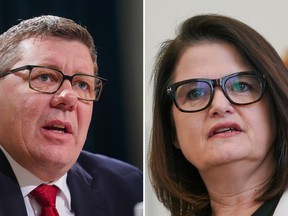“None of what we’re seeing in Saskatchewan is unique to Saskatchewan,” says political studies professor Daniel Westlake.

Article content
As Saskatchewan heads toward election day, many observers expect a tighter race than in recent elections.
While many constituencies in urban centres could change hands, it appears unlikely that much change will happen in the province’s rural ridings, which for the most part have elected Saskatchewan Party representatives for decades.
Daniel Westlake, a professor of political studies at the University of Saskatchewan, noted Alberta and Manitoba have experienced similar outcomes in recent elections, with the centre-right parties performing strongly in rural areas while centre-left opponents do better in urban ones.
Advertisement 2
Article content
A similar outcome was also seen in the recent election in British Columbia.
“None of what we’re seeing in Saskatchewan is unique to Saskatchewan,” Westlake said.
He said political scientists in Canada need to do more research to determine why these political splits are happening, but studies in the United States — specifically in states like Wisconsin and Kentucky — have shown that many people in rural areas feel alienated from larger centres.
“There’s this real sense that urban areas don’t represent, reflect the interests of rural areas,” he said.
Many rural Saskatchewan voters could have similar sentiments, which the Sask. Party, like other right wing parties, has been successful in speaking to and mobilizing, he said.
Some of the incumbent party’s messaging during the current election, specifically the focus on closure of rural hospitals in the 1990s, plays into a sentiment that rural areas are being left behind, Westlake said.
Similar feelings have been observed by researchers in the United States and are part of a larger political phenomenon, he noted.
Advertisement 3
Article content
“The urban areas are leaving the rural areas behind; the elites in the urban areas don’t seem to care, or don’t understand the interests of rural areas. I think that’s a North American story.”
Some rural ridings go against this trend — such as northern ridings with large Indigenous populations. This is the case for the NDP’s strongholds in northern Saskatchewan, northern Manitoba and somewhat in northern Ontario.
Bringing other rural ridings in Saskatchewan’s south and central regions into play might not be achieved simply by activating Indigenous voters there, Westlake said.
“Outside of those two northern ridings, the questions become: is the Indigenous population in these ridings large enough to tip the balance, and can the NDP convince enough Indigenous voters to vote for them?”
The Saskatchewan NDP has a difficult road to winning government compared to the NDP in Manitoba, where the road to victory primarily runs through Winnipeg, Westlake said.
“The rural vote in Saskatchewan plays a larger role in determining election results because its a larger portion of the Saskatchewan population.”
The Saskatoon Star Phoenix has created an Afternoon Headlines newsletter that can be delivered daily to your inbox so you are up to date with the most vital news of the day. Click here to subscribe.
With some online platforms blocking access to the journalism upon which you depend, our website is your destination for up-to-the-minute news, so make sure to bookmark thestarphoenix.com and sign up for our newsletters so we can keep you informed. Click here to subscribe.
Article content



